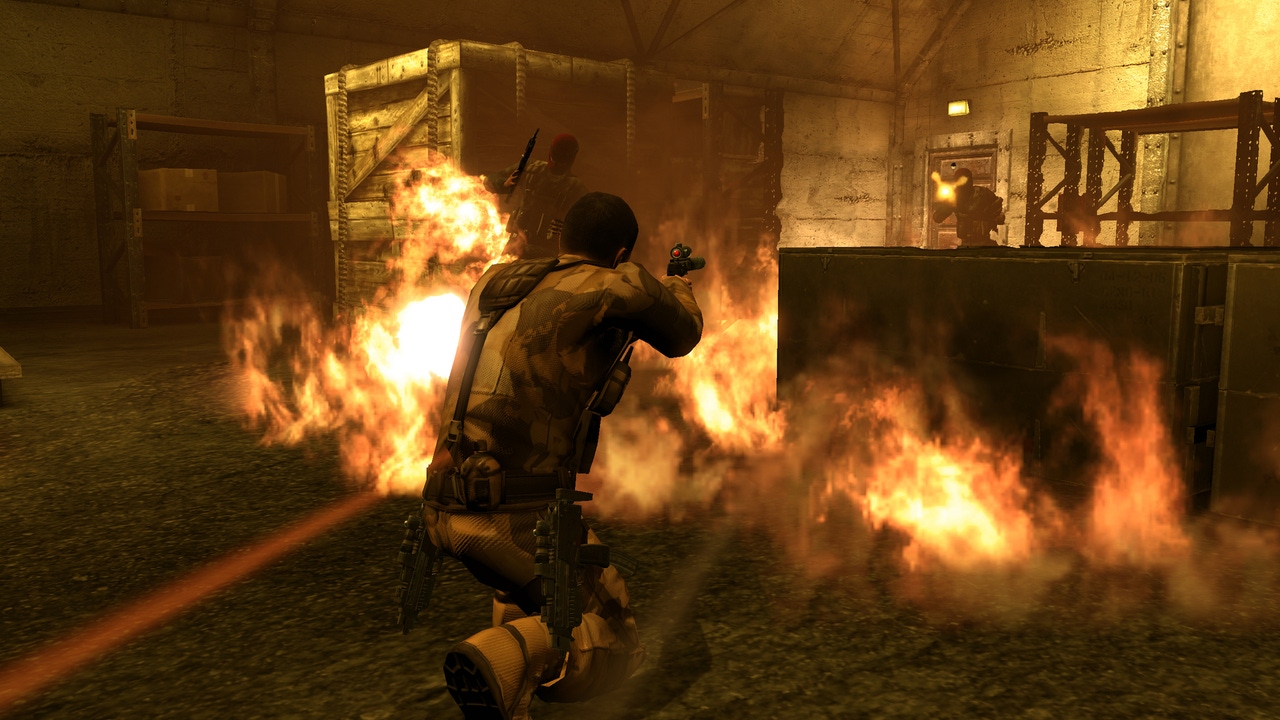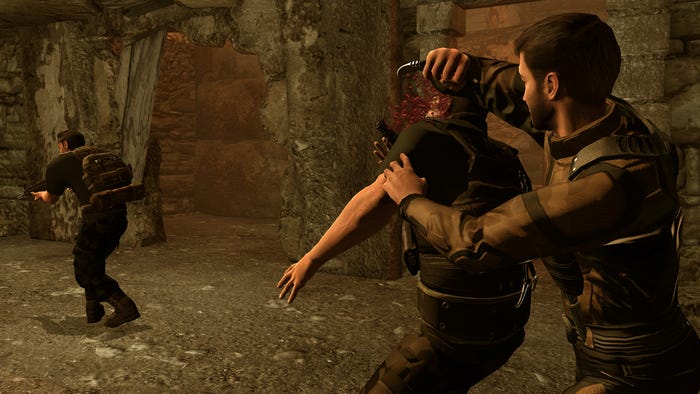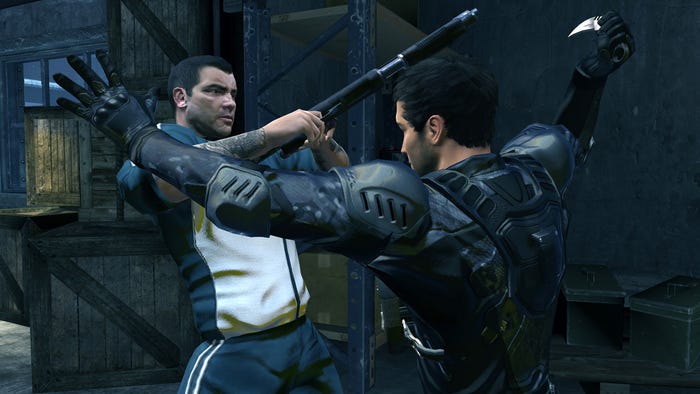Trending
Opinion: How will Project 2025 impact game developers?
The Heritage Foundation's manifesto for the possible next administration could do great harm to many, including large portions of the game development community.
July 16, 2024

Game Developer Deep Dives are an ongoing series with the goal of shedding light on specific design, art, or technical features within a video game in order to show how seemingly simple, fundamental design decisions aren’t really that simple at all.
Earlier installments cover topics such as how Ishtar Games approached the design of a new Dwarf race in The Last Spell, why Krillbite Studio pursued what they call the "Hollywood version" of cooking in upcoming food truck sim Fruitbus, and the authentically inauthentic animations of Little Kitty, Big City.
In this edition, GOG's game releases technical producer, Adam "Adim" Ziółkowski, tells us what the process was like updating Alpha Protocol for the modern era, particularly the demands on DRM and cloud saving.
Hi, I'm Adam "Adim" Ziółkowski, game releases technical producer at GOG, and today I'm here to talk to you about the challenges involved in updating a nearly 15-year-old game for a modern digital platform.
The typical first reaction from people is, "Why Alpha Protocol?" We're aware that when Alpha Protocol was released on May 28, 2010, it wasn't a perfect production. Obsidian Entertainment embarked on a very ambitious and extensive project, which, in many ways, can be considered revolutionary. Players received an espionage RPG with a highly elaborate storyline that drastically changes depending on their decisions. However, with such extensive projects, it often happens that ambitions begin to eat their own tail, and excessive growth of the game leads to difficulty in controlling it. That's why the developers weren't able to anticipate and eliminate all the bugs and problems that appeared after the launch. Nowadays, it's nothing extraordinary, as developers spend weeks, months, or even years fixing their productions. Titles that could be considered pulled from the depths of player disapproval include hits like No Man's Sky or Diablo III.
At GOG, we all believe that every game deserves a second chance, whether it was released a year or 20 years ago. One of our main goals, just like with Alpha Protocol, is to revive titles that are not available in digital distribution and bring back as many of them as possible. Bringing all titles from the past might very well be an impossible task, but that's why our entire company was created. That's our reason to exist.

Images via SEGA.
One of the biggest challenges in bringing back classic games is sorting out their status and all the legal issues, which have become complicated over the years. In the case of Alpha Protocol, the biggest unknowns were the licenses for music tracks. We aim to bring to our users versions that are as close in content to the originals as possible, so we worked together with the brand owner, SEGA, to regain the rights to the tracks featured in the game. To sum up this part of the process, I can say that we were able to renew the rights to all the tracks. However, the process of resolving these issues is not always easy and smooth. Sometimes, it can drag on for months, as was the case with obtaining licenses for Star Trek games.
This is important because the content of the version currently available on GOG will remain unchanged. Such strategy aligns with our DRM-Free approach, which applies to all games in the store. The reason being that, along with the game in their library, players gain easy access to an offline installer that includes all the tracks and can remain on their drives for as long as necessary.
With Alpha Protocol, we had the comfort of working on the source code of version 1.0. It's worth noting that there was a later version, 1.1, containing some fixes, but our team didn't have access to it. Furthermore, we were eager to continue working on version 1.0 because it allowed us to add, among other things, support for achievements, a feature that had not been previously available in the PC version.
The game build we received from SEGA already included some fixes, but not all of them. For instance, we had to make sure we eliminated one of the serious bugs, which often prevented players from finishing one of the main quests. I mentioned earlier that we always strive to deliver to players a version that is as close to the original as possible, but where we see room for significant and important improvements, we always try to implement them. With Alpha Protocol, this includes adding achievements and making the game compatible with GOG GALAXY for cloud saving. We also added support for higher resolutions and optimized the default game settings to match the capabilities of modern computers.
The hardest part was to recreate the developer's environment that would allow us to recompile the game's code and add achievements/trophies. In order to achieve that, we created a period-correct machine that would ensure proper code compilation. Then, we tested some of the older Galaxy Software Development Kit (SDK) versions to see if they would work with the old compiler. They did! Then, we could move forward and implement the Xbox version of the code that handled achievements for the game. This was the most exciting part of the project for us, as we were able to do something no one had done before. We added a unique feature that no other PC version of the game has.
Of course, we have optimized the version available on GOG to run smoothly on PCs with Windows 10 and 11. Another important change is the addition of support for modern controllers such as DualSense, DualShock 4, Nintendo Switch Pro, Xbox Series, and Xbox One pads. I must admit that DualSense Edge surprised us, but we are currently working on ensuring seamless compatibility with this device as well. On top of that, we brought back official language versions that were not available in the digital release. This includes Polish, Czech, and Russian localizations.

Images via SEGA.
The most important thing to us was removing DRM. This was particularly challenging because we didn't want to break the game itself. Fortunately, we have an experienced Reverse Engineer with 15 years of experience on board, who has often helped us out of trouble with much more complicated and convoluted projects. Considering the overall technical work, getting rid of DRM was indeed the most labor-intensive and time-consuming part of the entire process of bringing the game back.
To emphasize how important it is to us that the presence of Alpha Protocol is never again compromised, we distributed 500 keys to our most engaged users. Additionally, this provides an opportunity to express our gratitude to the community, which, for the past 15+ years that GOG has existed, has been instrumental in helping us ensure that games last forever.
Maybe Alpha Protocol didn't receive a warm reception years ago, but it was heartening to see the media's interest when it returned to GOG. Major gaming portals wrote about our surprise release, and some editors revisited the game to see how it holds up after all these years. We also received many positive comments from our community, who were delighted to see another classic restored while reminding us of other titles in need of revival. We want to reassure you that we're doing everything we can to bring back to you as many games as possible.
You May Also Like